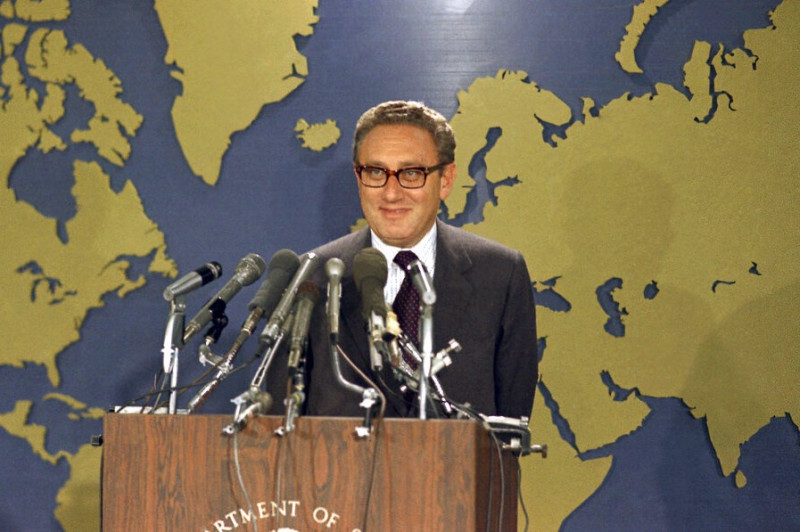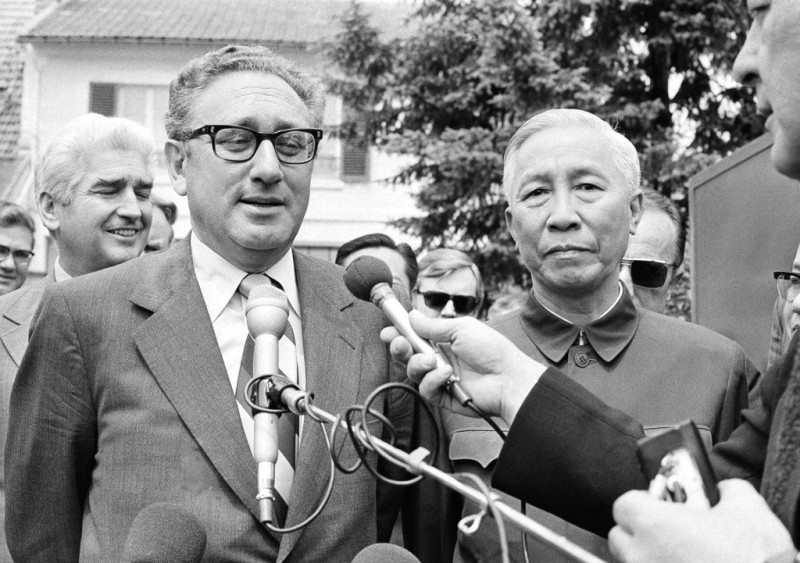Former US Secretary of State celebrates his 100th birthday tomorrow and remains controversial
The former US Secretary of State Henry Kissinger (Henry Alfred Kissinger), the man who put his stamp on United States foreign policy in the second half of the 20th century – celebrates his 100th birthday tomorrow, Saturday,
A visionary for some, a “war criminal” for others, the “sage” with a stooped silhouette always remains recognizable with his thick-framed glasses, but also active.
The former US top diplomat attended a 100-year event at the very exclusive Economic Club of New York on Tuesday, blowing out candles on a chocolate cake.
Also, although a century old, he retains – in part – the attention of the greats of this world and offers his advice on matters of geopolitics, continuing to fascinate and divide.
From his offices in New York and the consulting firm Kissinger Associates, he maintains a relative cachet among elites in Washington and abroad, including Democrats such as former Secretary of State Hillary Clinton, who once said she “relies on the advice ” of her “boyfriend”.
“Realpolitik”
Undisputed protagonist of world diplomacy during the Cold War, he Nobel Peace Prize laureate began the approach with the Moscow and Beijing in the 70s, having a realistic vision of the world, a kind of “realpolitik” a la American.
In a sign that his vision for the world hasn’t changed, he told his colleagues on Tuesday that the United States must defend its “vital interests.”
“We must be stronger and stronger to resist any pressure,” he underlined.
On the war in Ukraine, he proposed a ceasefire. “We have reached a point where we have fulfilled our strategic objective. Russia’s military attempt to absorb Ukraine has failed.”
But the image of the man with the hoarse voice and accent he inherited from his German ancestry remains dark and linked to dark pages of United States history, such as support for the 1973 military coup in Chile or the 1975 invasion of East Timor. and, of course, Vietnam.
“To me, there is no doubt that his policies have caused hundreds of thousands of deaths and destroyed democracy in numerous countries,” says Reed Kalman Brody, a human rights lawyer.
“I’m amazed he managed to escape like that,” he adds.
Bombings, genocides and a Nobel Peace Prize
Indeed, Henry Kissinger was never bothered by justice, as an appeal against him was filed in 2004.
In an investigation published Wednesday, the Intercept, an investigative journalism website, argues based on documents from the Pentagon archives and testimony from survivors that the US bombing campaign of Cambodia from 1969 to 1973, of which Henry Kissinger was the architect, was widely underestimated as it resulted in far more civilian deaths than previously acknowledged.
Historian Mudasir Mamun of Dhaka University underlines for his part that Kissinger “actively supported the genocide in Bangladesh» in 1971.
“I see no reason to praise Kissinger,” he says, adding that his view is shared by numerous countries, including Vietnam.
“The irony is that we have kept that he made peace, but we forget all that he did to prolong the war, not only in Vietnam, but also in Cambodia and Laos,” agrees historian Carolyn Eisenberg of the American Hofstra University.
The recession with the Soviet Union and the thawing of relations with Mao’s China
German Jew Heinz Alfred Kissinger was born on May 27, 1923 in Firth, Bavaria. At the age of 15 he fled with his family to the USA and at the age of 20 he became a naturalized American.
The son of a teacher, he joined military counterintelligence and the US Army before embarking on a brilliant course at Harvard, where he also taught.
He imposed himself as the face of world diplomacy when the Republican Richard Nixon called him to the White House in 1969 as national security adviser and then as secretary of state – he held both posts from 1973 to 1975 and remained chief of foreign affairs under Gerald Ford until 1977.
It was then that he began the détente with the Soviet Union and the thawing of relations with Mao’s China, making secret trips to organize Nixon’s historic visit to Beijing in 1972.
He also conducted, always in the greatest secrecy and alongside the bombing of Hanoi, negotiations with Le Duc Tho to end the Vietnam War.
Source :Skai
With a wealth of experience honed over 4+ years in journalism, I bring a seasoned voice to the world of news. Currently, I work as a freelance writer and editor, always seeking new opportunities to tell compelling stories in the field of world news.












